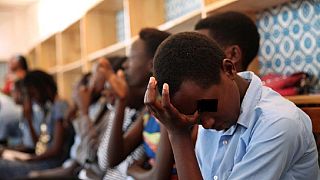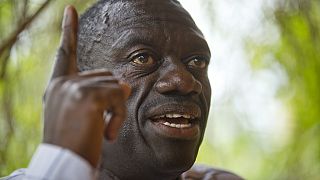Kenya
A group of disabled Kenyan women makes a living by sewing reusable sanitary pads.
The Mombasa say the product is much needed in a country where women sometimes struggle with the monthly cost of disposable pads.
"Our pads are cost-effective because when I use it, you do not buy another pad, and it is used for three years," Charity Chahasi, the director of the Tunaweza foundation says.
"Then you can even buy another one after three years...But the other pad you buy it every month, and so it is very much expensive. It is also environmentally friendly".
The Tunaweza foundation faces all sorts of difficulties to manufacture and bring their product to market.
But in a good month they can make 3,000 pads in a week.
"One of the challenges we have is machines. ...the machines we have are actually manual. Another problem is transportation. Actually, we have problems of transportation ...when we are going actually for marketing the reusable sanitary pads... we are going looking for market for the pads, we are taking it to post it...
Tunaweza now employs over 20 people, making it a big win both for the workers in a nation where people with disabilities often confront negative attitudes and are forced to lead a precarious existence with little social support.
Customers are happy too. College student Anne says she has no regrets about making the switch to Tunaweza's pads.
READ ALSO: Like South Africa, Rwanda scraps tax on sanitary pads
"My high school education was hard when I was using the classic pads; I was not comfortable with them [...]That is when I met my friend who told me about the group of women who are making the reusable sanitary pads. they taught me how to use them, how to wash and maintain them . ....."
Disposable pads are practically impossible to recycle. They break down, like any other plastic material
The success of the pads benefit to the environment is plain to see.












01:36
Kizza Besigye faces Military Court as Uganda-Kenya jurisdiction row deepens
01:58
Women's health advocates in Africa worry Trump will cut funds for birth control
01:10
COP29 data reveals most polluting cities
01:10
South African beauty queen withdraws from Miss Universe pageant
01:14
Delegates express cautious optimism on second day of climate summit
02:34
Initiative in Nairobi's Mukuru slums uses fly lavae to tackle food waste